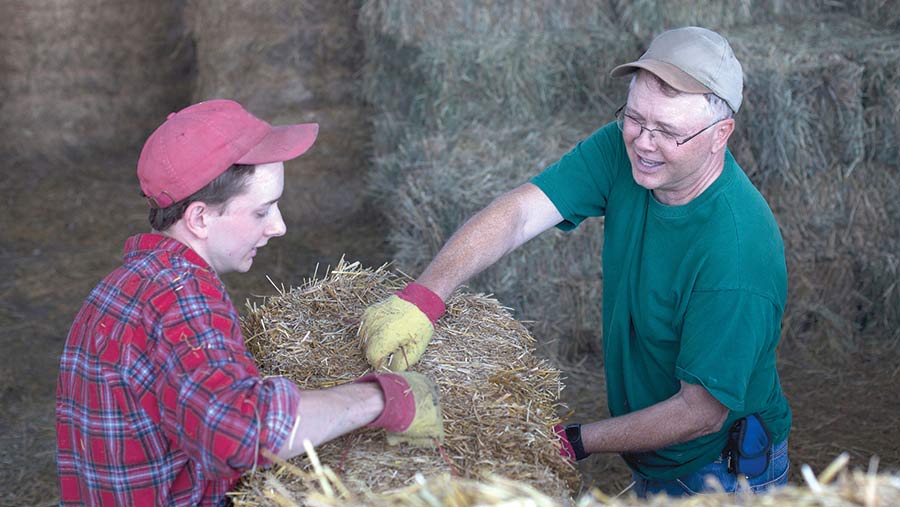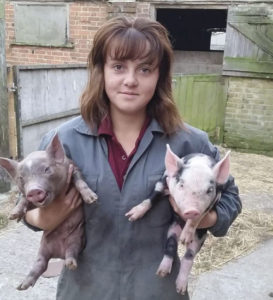Why you should consider a land-based apprenticeship
 © Image Source/REX/Shutterstock
© Image Source/REX/Shutterstock The opportunity to earn while you learn will be an appealing prospect for many young people. So what’s involved in a land-based apprenticeship and could one be right for you?
Some young people dream of heading off to university or college, but there are plenty for whom the idea of another three or four years in a classroom just isn’t an option.
It’s not that they don’t have the talent, ambition or desire to gain the skills and qualifications they need for their chosen career path. But they are looking for alternative ways to kick-start their career than full-time study and, for many of them, an apprenticeship is the perfect choice.
See also: For the latest careers news and advice from Farmers Weekly
Richard Self, panel chairman of the agriculture, environment and animal care stream of the Institute of Apprenticeships, says the opportunity to earn while you learn is one of the main appeals of apprenticeships.
“Tuition fees for university are a barrier to a lot of people and so the idea of being able to study without incurring big student loans is very attractive,” he says.
“Some people just don’t want to get into debt, while other families simply can’t afford for their kids to go to university.
“However, I think there are also some people who are very practically minded who choose an apprenticeship because they prefer the idea of developing their skills while on the job.”
Why employers like apprenticeships
Mr Self says that the apprenticeship model is particularly strong in the field of agricultural engineering and the poultry sector, where employers have recognised that the best way to secure the highly skilled workforce they need is to “grow their own” staff.
But this is something that more employers in the food and farming industry need to acknowledge.
Most farm businesses are now employing a wide range of technology and need higher levels of skills among their employees than they might have in the past.
The farming industry has also traditionally relied on high levels of migrant labour – with many currently in supervisory and management positions.
As Brexit approaches, farmers could need to find new ways to meet their labour requirements.
What does it involve?
Apprenticeships can take between one and five years to complete and combine on-the-job learning with a formal training programme, usually delivered by local land-based colleges, either through a day- or block-release arrangement.
The apprentice is paid a wage and gets full employment rights, including eligibility for holiday pay, from the day they start work.
The government sets down a National Minimum Wage for apprentices, which is currently £3.50/hour for under-19s and anyone in the first year of their apprenticeship.
However, some employers will pay over and above these rates.
Questions to ask about an apprenticeship
- What steps will the employer be taking to help train you?
- Who will you work with and how will you be helped to learn?
- How interested does your potential employer seem in apprenticeships – do they buy into the concept?
- How much off-the-job training will you get and where will that be delivered?
- Who will be available to help if you have a problem with either your training or your employment?
- What will happen after you complete your apprenticeship – will you be kept on and, if so, what will the pay and conditions be?
- What opportunities will you have to progress to a higher level?
- Will you be allowed to complete your pesticides (PA1 and PA2), forklift and chainsaw competency tests?
Source: Richard Self
What are the options?
Traditional three-level framework apprenticeships in the land-based sector comprise Level 2 (intermediate), Level 3 (advanced) and a limited number at Level 4 (higher).
These frameworks still exist, but reforms recommended by the 2012 independent Richard Review are beginning to bring big changes.
For the past two years, employer-led panels have been acting on the reforms, developing what are known as “trailblazer” apprenticeships. These introduce standards that are more relevant to employers and have a more rigorous end-point assessment.
The panels have set down the knowledge, skills – and, for the first time, behavioural standards – they will expect of apprentices to make sure they can quickly slot into the workplace.
A trailblazer apprenticeship in land-based service engineering (Level 3) was rolled out in September 2017 and more are expected to follow in the new year, including stockperson (Level 2), crop technician (Level 3) and packhouse line leader (Level 3).
Degree-level apprenticeships
The days when apprenticeships were viewed as something for less academic students are also long gone.
Although it isn’t yet possible to study for a degree-level apprenticeship in agriculture, plans are in motion to make this a reality.
Degree-level apprenticeships are already available in some related fields.
For example, poultrymeat company Moy Park is working in partnership with the National Centre for Food Manufacturing at the University of Lincoln and Nottingham Trent University to deliver a four-year, degree-level apprenticeship in food science technology.
More information
Gov.uk information on Land-based service engineer apprenticeships
Case study: ‘I knew I wanted to work outdoors’
Lizzy Tresadern had no experience of the farming industry when she decided to do work experience on a local pig farm.

She had just finished her GCSEs and knew that she didn’t want to stay in full-time education where she was stuck inside all day.
“I didn’t enjoy being inside at school and knew I wanted to work outdoors,” she says.
“Farming was completely new to me and I was really unsure at first, but I found that I loved working with the pigs. A few weeks later I signed up as an apprentice on the same farm.”
Lizzy’s first choice of course was a two-year, Level 2 work-based apprenticeship in agriculture (livestock), which was delivered jointly through her employer, Grange Farm, Latchingdon in Essex, and Writtle University College.
Having successfully completed that, Lizzie – now 18 – is currently working towards a Level 3 apprenticeship in agriculture, but this time she has chosen to take both the arable and livestock options.
At any one time, the family farm she works on is looking after about 1,000 pigs and Lizzie’s job day to day is to help make sure that the stock are happy and healthy, which involves ensuring they are fed, watered and bedded down on clean straw.
She starts each day in the farrowing shed, making sure that any piglets that have been born are safe and well. Once she’s finished in there, she moves on to the shed with the fattening pigs. She also helps out on the farm’s vineyard.
“Every Tuesday I go to college for the whole day and then I am back on the farm for the rest of the week. It’s nice to have the day at college and I have made loads of really good friends there.
“A lot of people I know have gone to college full-time, but I think it has been really good to earn while I have been learning.
“I would definitely recommend an apprenticeship. It just makes more sense to me – you are making money and you aren’t sat down all day and then looking for a job after college. You are straight into the job and can learn as you go. It’s brilliant.”
